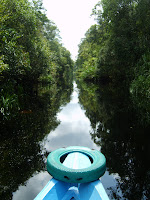Orang outang: literally, that means “Man of the forest” (Orang Hutan). You can find them only in the island of Sumatra and Borneo, which is divided between Malaysia and Indonesia; the Indonesian part is called Kalimantan.
The local people of Kalimantan are called the Dayak. Solenn went to a Dayak village along a river. A wedding was in preparation, so food was served to the guest and a man was singing traditional songs.
We went there during the Lebaran, which is the holidays following the fasting month; pretty much the equivalent of Christmas. Solenn went first in order to report about deforestation there which is going at an amazing speed. Here is a little extract of a piece she wrote.

“You’re going to Borneo”. I immediately picture myself clinging onto a sweat-drenched machette, trying to hack a path through the thick jungle while ominous creatures (think: snakes) loom 30 meters above my head, just waiting to make their deadly drop. But last month I drove for 12 hours through Central Kalimantan province without seeing a single tree that could compare in mightiness to the old cherry tree that used to adorn the vegetable patch in my grand-mother’s garden. 30 years ago, the whole island of Borneo was covered by a dense tropical canopy but today its forest cover looks like the fur of a dog suffering from mange: half of its trees have already disappeared. Slashed, burnt, cut, hacked or transformed into the beautiful bed side table you noticed on page 42 of your favorite furniture shop’s catalogue.

Nature has taken over alright; it always does. But you’d have to be a very very small child with a very very big imagination to recall the Green Hell described by the first British adventurers who came out of it alive. Instead of the mighty trees, you can stand waist-deep in the middle of lush bushes that extend to the flat horizon. The monotony of the landscape is only broken by gloomy cadavers of burnt trees whose white carcasses all spell one word: GREED.
Jakarta’s bureaucrats overlooked one tiny complication: the area chosen for the so-called Mega-Rice project is way too acidic to be able to bear the brunt of a demanding crop like rice. “but I think they knew. The experts knew. I tell you: they were educated to be stupid” growls Yarden, a scientist in the university of Palangkaraya, the provincial capital. “So why they did it? Why?... They just wanted to take the wood. Money”.
…

Today, the main danger for the forests is palm oil. You know, the green fuel that is supposed to feed our SUVs when all the Arab oil has been drunk? Well, this is big business now, but plants require land in order to grow. Where do you find land? You cut down the forest. Now, this is the main danger for the orang-outang. You can find here the explanation from Lone Nielsen, a blonde Dane who manages a rehabilitation camp for the animal. Solenn went to visit her, and was taken in the back forest where baby apes are kept. (Note: the difficult thing is that orang outang are solitary animals, and the mother has to care about her baby until they are 7 years old, so their reproduction cycle is very slow). Wonderful experience, sometimes cut short when a curious baby would try to grab the microphone or just wanted some petting...












1 comment:
This post practically takes my breath away. I was fascinated to hear the two opposing sides. The sentence, "Slashed, burnt, cut, hacked or transformed into the beautiful bed side table you noticed on page 42 of your favorite furniture shop’s catalogue," then you flip us upside down with, "However much you can think that the people are crying about their lost forest, you’re wrong." It's this juxtaposition of the two sides that makes any environmental issue so difficult to deal with.
Post a Comment